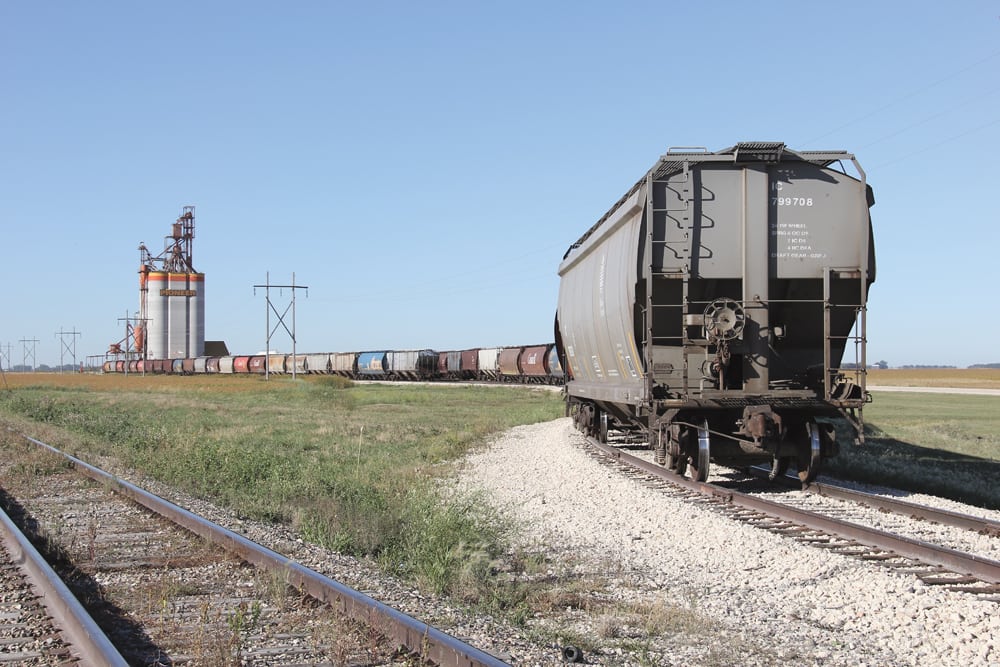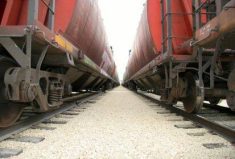Western grain shippers are counting on better rail service after the Transportation Modernization Act (Bill C-49) became law May 23 to the delight of grain companies and farmers.

During a news conference at Richardson-Pioneer’s South Lakes elevator both groups lauded federal Agriculture Minister Lawrence MacAulay, Transport Minister Marc Garneau and the Senate transport committee for their role shaping the “historic” legislation giving grain shippers tools to make railways accountable when their service is poor.
The act is credited with encouraging CN rail to build 1,000 new hopper cars in Canada.
The act also changes the maximum revenue entitlement (MRE) regulating the total amount of money railways can earn shipping western grain, accounting for each railway’s investment in grain shipping.
The omnibus legislation, which was introduced in the House of Commons a year ago, and includes many changes to the Canada Transportation Act beyond grain, was batted back and forth between the Commons and Senate, raising concerns it might not be passed before Parliament breaks for the summer and the start of the new crop year.
Read Also

Canadian Cattle Association names Brocklebank CEO
Andrea Brocklebank will take over as chief executive officer of the Canadian Cattle Association effective March 1.
That raised fears this year’s massive shipping backlog, the second in five years, might repeat in the 2018-19 crop year.
The push to address rail service for grain goes back a decade or more.
As pleased as shippers and farmers are, especially after two grain backlogs in five years, no one is raising a ‘mission accomplished’ banner.
That’s because the railways have a reputation for playing hardball. Legislation now compels them to reach level-of-service agreements with grain companies. But since railways now face financial penalties for poor service, they’re expected to be conservative with their service commitments.
If railways and grain companies can’t reach an agreement a third-party arbitrator will broker a deal.
It could take six months or longer to see how effective service level agreements are, Wade Sobkowich, executive director of the Western Grain Elevator Association, said on the sidelines of the news conference.
If the act works as hoped grain companies will get the grain cars they need to ship grain when prices are best.
“This will result in better returns for farmers, a stronger supply chain and more opportunity for all Canadians employed in getting grain from the Prairies to our markets,” Sobkowich said.
A more efficient rail system will help Canada become known as a reliable supplier and help Canada export $75 billion of agricultural goods by 2025 making Canada the world’s second-biggest agricultural exporter, he said.
Measuring whether the act is working is easy, said Greg Cherewyk, Pulse Canada’s chief operating officer.
“It’s achieving greater and greater capacity and improved service (when it’s demanded not later),” he said.
“I’ll be happier when I start to see that play out week to week when I start to see my members getting the level of service they expect to get. That’s when I’ll start celebrating.”
Besides service agreements and penalties for failing to fulfil them, the new act adds soybeans to the MRE along with most other major western crops.
It also better defines adequate and suitable rail service, gives grain companies access to competing railways through long-haul interswitching, allows the Canadian Transportation Agency (CTA) to monitor grain shipping, and with the permission of the transport minister, investigate suspected problems.
Before the CTA could only act when a grain company launched a formal complaint against a railway. It was costly and time consuming and sometimes shippers were reluctant to challenge the railways for fear they would get even worse service.
“I am confident this legislation will deliver better (rail) service, better grain movement and a stronger economy,” MacAulay told the news conference.
But he told reporters later: “(J)ust because C-49 passed (yesterday) everything is not fixed today.”
The new act is needed because the railways are natural monopolies and grain shippers are captive to them, Sobkowich said. The railways know if grain doesn’t move when grain companies want it to, it will eventually move when the railways can do it. Financial penalties for poor service is expected to encourage the railways to provide the service that could be expected in a more competitive market, he said.
“I think the building blocks are there (for better service),” Jean-Marc Ruest, Richardson International’s senior vice-president of corporate affairs and general counsel, told reporters. “I think a large part of it depends on the goodwill of the parties to work together.
“I think we’ll have to expect and rely on the parties to treat one another fairly. I think as well we’ll have to ensure that places like the CTA are well equipped to be able to administer these remedies effectively if we do need recourse to those remedies.”
Long-haul interswitching is one remedy, especially when one railway is performing better than another, he said.
“It’ll be interesting to see whether the railways do want to compete against one another and are seeking that extra business,” Ruest said.
Farmers see a lot of potential in the new act.
“Rail is essential to the success of my operation and every other grain farmer on the Prairies, that is why I know I speak for 50,000 grain farmers when I say the passage of Bill C-49 is great news for the future of our industry,” Art Enns, vice-president of the Grain Growers of Canada, said. “For far too long the grain industry has been at the mercy of the railways with no way to hold them accountable for poor rail service.”
Keystone Agricultural producers president Dan Mazier agrees. The CTA’s new investigative power is “a very big win,” he said.
“We’re in a much better place today.”
Manitoba’s Agriculture Minister Ralph Eichler thanked MacAulay.
“This is a pretty important piece of legislation,” he told the gathering. “We need to remain competitive, market based… and achieve a commercial balance of power between shippers and railways.”


















